Censorship Versus Creative Freedom
What can we do when we're surrounded by restrictive, often oppressive systems?
Censorship, generally speaking, is harmful. When we think about censorship, it’s easy to conjure up things like banned books, and language policing. It’s often prudish, fearful, or downright fascist movements that build systems that censor any dissent or opposition. I’m not arguing in favor of free speech absolutism. It’s absolutely true that language can be manipulated to cause harm to persons or groups, or to create conditions of violence toward persons or groups. However, I think it’s important to consider harm and benefit when we consider what it is we choose to censor and why.
More often than not, in America, we lean toward censoring anything dealing with sex or even anti-capitalist sentiment. While banning and maligning sex has been a part of our puritanical, purity-culture landscape, we attack anti-capitalist sentiments by calling its proponents, “socialist,” or, “communist,” and sometimes imprisoning them. It’s a two-fold approach. The former tells you whatever we ban or marginalize is morally abhorrent or sinful. The latter groups people into good or bad labels that are fighting for power in our nation.
It’s intricate and baked into many of our systems. When it comes to entertainment, which is ultimately the business I’m in, we see censorship seep in from our culture into our work. Cultural and legal mechanisms impact the banks that could give us money, or secure our funds. That, in turn, informs our publishing channels (television, books, movies, Substack, YouTube, etc), of how we can be expected to behave, especially those moderated by the FCC and other moderating bodies. All of these channels and outlets are ultimately influenced further by their current and potential advertisers as to what kind of media they want to be seen next to. Disney doesn’t want to advertise a family cruise on PornHub. It’s bad for their brand identity. This ultimately results in most of our entertainment leaning toward whatever the cultural status quo is, and behaving as generically as possible.
While I think we ought to take a long look at what we censor, and why, I think this system is fascinating. I’m all for deconstructing it, but the reality is that if we want to succeed in the systems we have, we have to play by their rules. It’s a pickle to operate within a system that might deserve destruction while also striving for that destruction. I think it’s one of the reasons we see creative heroes digress into parts of that system when they find financial success. But, I digress. What if I told you that some of these creative constraints can be good for the creativity of our products?
Adult entertainment, specifically in illustrative arts like comics and animation, is often locked in a battle with censorship impacting creativity. Most platforms and cultural consensus lump comics and animation into children’s entertainment. It might have whimsical characters, or bright colors, which are all things that only appeal to kids, right? Success of comic book movies, and adult oriented comics television has definitely moved the meter, it’s still largely inescapable.
I grew up in a world that saw Family Guy and South Park as unusual outliers of adult entertainment that stood to prove that cartoons are not just kids entertainment. Both of these shows emerged on networks that had various rules to enforce. Fox wanted to be the cool kid in network television, but still needed to entertain the median general audience with Family Guy. Comedy Central, as a cable channel, had looser rules, but not limitless freedom. They sought to appeal to people interested in stand-up and raw comedy. South Park had to play by those rules. Before I go any further, I want to admit that my taste has grown pretty far away from shows like Family Guy and South Park, so that may impact some of what I’m about to say. But, I think both of these shows found huge success because the channels they were required to work with gave them a line to push against.
Sometimes our best creativity can come from constraints. Whether that’s budgetary constraints, client constraints, or censorship, thinking outside the box requires you to have a box to start in. Family Guy and South Park had different, but ultimately very similar, boxes to fit into. Family Guy could only be as edgy as The Simpsons or other sitcoms. South Park could do a lot more, but had to live up to strict visual and language rules. I think both of these shows found their largest, longest lasting audiences, by pushing against and playing with these rules. In my opinion, these shows both found enough power to redefine what the rules were and could be.
Redefining the rules can open our worlds up to new, wonderful content that gets the opportunity to build off what came before. Unfortunately, when a piece of media redefines the rules, it risks sinking into less creative waters and becoming the generic slop that it was defining itself against. I feel this was the fate of Family Guy and South Park. Both shows found themselves functionally in charge of the rules that would otherwise censor them and became caricatures of what they once were. They evolved into raunchy without purpose, and dumb with less value shows. They began as appealing to more niche audiences and found themselves at the center of the general audience.
I drag all this out because I am always butting up against censorship, too. When Champions came out, it fell into the, “comics are for kids,” bucket while being anything but. The story is sad, the art is gritty. Characters smoke and kill monsters. They fight with one another. I couldn’t bring it out to educational residencies, although it was the bulk of my work. I even had teachers gripe to me about its content when they looked it up.
Recently, my new single panel, vignette-style webcomic, Violet 9, was censored by its platform, Webtoon. I was shocked because they have several controls for flagging content as mature. I could say that it’s violent, or vulgar, or sexual. They even had signifiers for degrees of each. I felt pretty confident that with all the flags in place, Violet 9, would float just fine. But, it turns out their nudity rules are inflexible regardless of flagging. It shocked me, and I am working on editing the current episode to better fit their rules.
When the episode first got taken down, I was upset that Webtoon’s rules seemed so barbaric. Why let me flag something as sexual if I can’t actually show that content? I was fuming because it felt like another hit of puritanical censorship. I can show heads blowing up before I show someone naked. Our culture has an acceptance of extreme violence — a terrible vice — instead of representing anything in our sexual spectrum. There are heroes and villains, but no lovers.
What was I going to do, just accept their rules? I could find somewhere else to host it. But, I picked Webtoon for good reasons. They have audience growth I understand, metrics I find useful, and they integrate into Patreon which helps turn readers into members of our community. Furthermore, I just produced a convention banner with a Webtoon QR code! Was I just succumbing to the Sunk Cost Fallacy if I stuck it out?
I fought with that thought the entire weekend. I’d already lost a week of readership. I have time to figure this out. While I think Webtoon’s rules are draconic, I still agree with all the reasons I started publishing with them in the first place. I am required to operate within the systems we have, even if I disagree with them. Though I am an advocate for change, I don’t have the means to gather the audience for Violet 9 without the power of a system I don’t like. It’s a tough spot to be in. But, it became an inspiration by the time of writing this.
I feel that Violet 9 could thrive by having some of these boundaries and doing its best to push them. That doesn’t mean I can make sexier episodes like the contested one, either. It just means those episodes could be Patreon exclusives. Sure, I can find other places to host the comic, but having boundaries I think should be broken is inspiring. How can I push them while I create? What can I get away with?
Do I think this project is the one that will rise like Family Guy and redefine the constraints I have? No, not necessarily. But I think that wrestling with these constraints could be good for me and whatever storytelling comes out of it. I want to change things. I want there to be more acceptance of any story, even if it's risqué. While I’m not arguing against age restrictions, I think we should have more room for what we could say. Maybe the silver lining is that, if Violet 9 doesn’t redefine the rules, it won’t devolve into a caricature of what it could be.
I’ve frequently sought to create work that is incredibly niche. It’s not necessarily good for sales, but it’s more true to who I am as a person. I’m frequently conflicted, I struggle, and I’m into things that are also niche. Why would I strive for a median audience when that’s hardly me? Working in any niche will always find us bumping against rules we don’t like and rules that we ought to change. What better way to work against them is there than creating content that pushes against them?
Did you want to see the episode that got removed? Members of the Brimstone Order have had access to it for the last week! Go check it out. With any luck, the clean edition of the episode will be up this week!

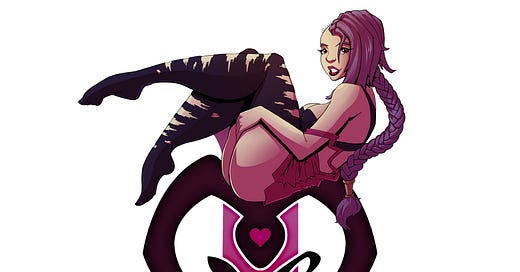


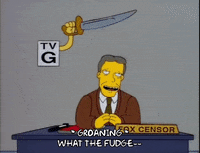
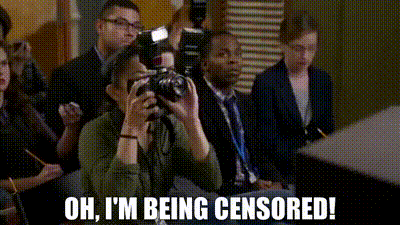
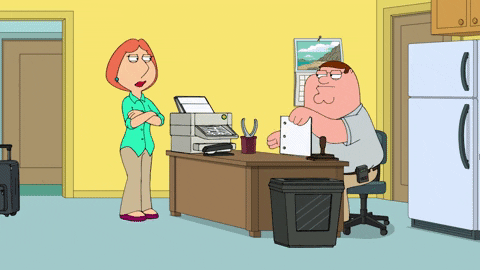
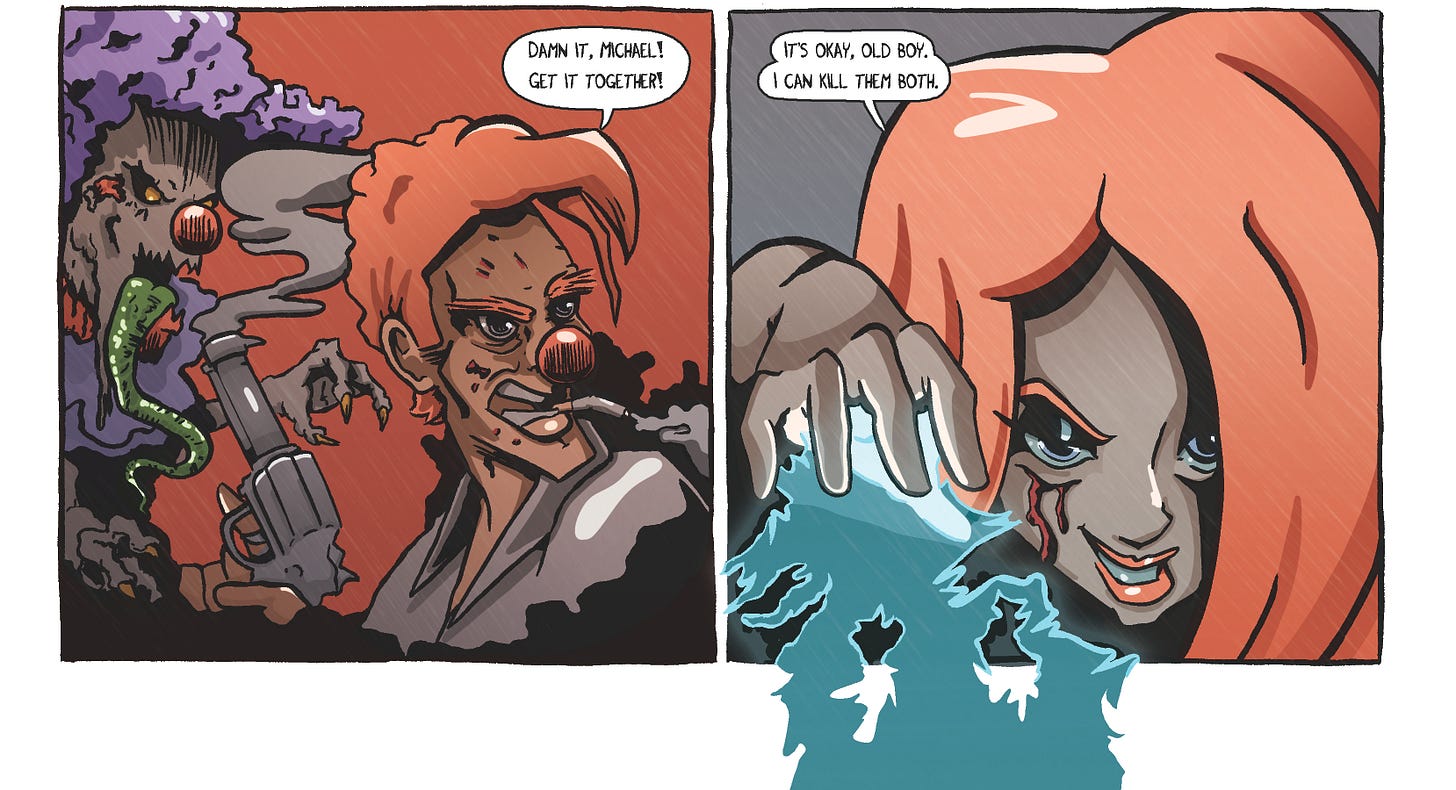



Interesting with Webtoons. I think they are so mainstream now they want to avoid all that, but anime has a deep seated horniness so it’s all confusing. I for one but penis in my comics because we don’t see enough cock.